KING COUNTY, Wash. — The Washington State Department of Labor & Industries (L&I) is requiring King County to improve worker safeguards at the Cedar Hills Regional Landfill, which has come under scrutiny for elevated levels of arsenic and worker health concerns.
After completing a health and safety inspection prompted by a KING 5 investigation, L&I cited the King County Solid Waste Division on Feb. 23 for three violations at the Maple Valley facility. Two of the violations involve the absence of arsenic protections in written county plans.
“Every violation is significant and important,” said Matt Ross, an L&I spokesperson. “The key thing that every violation carries with it is the requirement to fix the problem.”
State inspectors found King County did not include “potential arsenic hazards” in their assessments of what personal protective equipment (PPE) was necessary to keep Cedar Hills’ employees safe from workplace hazards, according to the L&I citation.
L&I also found the county did not develop a complete written “Accident Prevention Program” at the landfill. Cedar Hills has been grappling with an arsenic problem for more than a decade as a result of its process of managing landfill gas, but state inspectors noted King County “did not cover any arsenic hazards” in the landfill’s safety plans.
“The safety plan is really where the employer and the employee come together around a written plan to keep workers safe on the job. It's how employees know what to expect – in terms of training, in terms of access to protective equipment, in terms of jobs and tasks that may be prohibited,” said Ross. “It’s an important document.”


The third citation involves an administrative update to a respirator protection program for workers.
L&I classified the violations as “general” – a severity level it uses when inspectors observe conditions that “could cause injury or illness to a worker, but would not result in serious physical harm.”
The agency did not issue fines with the citations.
“While any citation is a serious matter, none of the violations involved an unsafe worksite condition,” wrote Pat McLaughlin, King County Solid Waste Division director, in a March 12 statement.
McLaughlin, who oversees the Cedar Hills landfill, said the division is taking corrective actions in response to the L&I violations, including updating safety plans so “employees are informed of all potential arsenic-related hazards.”
“The division is also identifying the appropriate emergency actions to take after an accidental exposure to arsenic, as well as a wide array of other chemical hazards,” he wrote.
King County must either appeal the L&I citations or prove it has resolved them by March 17.
L&I opened the probe on Dec. 14 in response to a November KING 5 investigation, which highlighted health and safety concerns from Cedar Hills' workers about exposure to arsenic on-the-job. KING 5’s reporting revealed that elevated arsenic levels at the landfill led King County to repeatedly violate local and state rules that exist to protect the environment and public health.
Four King County employees, including a Cedar Hills truck driver and three engineers who were closely involved in the county's efforts to deal with the arsenic problem, accused their bosses of failing to inform workers or protect them from the highly toxic chemical.


“They’ve never really thought hard about what protection people need,” said Colleen Christensen, a King County Solid Waste Division engineer who has filed multiple whistleblower and workplace safety complaints related to Cedar Hills’ arsenic problem. “I’m very pleased that L&I is requiring them to do this.”
Jon Demello, a veteran Cedar Hills truck driver who said he’s dealing with work-related respiratory problems, said his King County bosses left him in the dark for years about arsenic hazards at his workplace.
“They knew about the arsenic. Why didn’t they protect us?” Demello said.


McLaughlin said there is no public health risk from arsenic at the landfill. He cited the county's results of employee air monitoring from December, which he said showed “no detectable airborne arsenic levels.”
The Puget Sound Clean Air Agency (PSCAA), which regulates Cedar Hills air quality, ordered King County in November to perform more thorough airborne arsenic testing at the landfill to assess whether the air is safe for workers and the public to breathe. King County must submit its final analysis by May 21, according to a PSCAA.
After the KING 5 investigation in November, McLaughlin and his team began updating workers on a weekly basis about their efforts to address the arsenic problem.
Ross said L&I’s inspection, which only reviewed Cedar Hills' current practices, found the Solid Waste Division was appropriately communicating with workers about arsenic hazards.
“To be clear, we did find that they were conducting trainings on arsenic exposure. We found that they were informing the employees and their workers about what PPE was needed, where to find it, how it was available… that just wasn’t reflected in the written plan,” Ross said.
This isn't the first time L&I cited Cedar Hills for arsenic-related violations.
In 2021, the agency’s Division of Occupational Safety and Health fined King County $3,000 and ordered the landfill to correct workplace safety violations affecting Christensen and her team.
L&I investigators found, in part, that Cedar Hills did not train employees on the hazards of arsenic, did not evaluate employee exposure to airborne inorganic arsenic during a key timeframe, and did not make sure employees who were sampling arsenic-contaminated wastewater used personal protective equipment, according to a review of the L&I citation.

